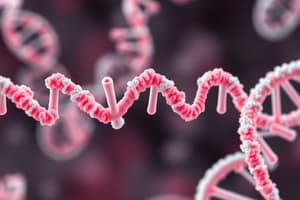Podcast
Questions and Answers
Which of the following drugs inhibits DNA gyrase and is primarily used to stop replication?
Which of the following drugs inhibits DNA gyrase and is primarily used to stop replication?
- Metronidazole
- Fluoroquinolones (correct)
- Nalidixic Acid
- Rifampin
Which agent is known to cause optic neuritis as a side effect?
Which agent is known to cause optic neuritis as a side effect?
- Isoniazid
- Ethambutol (correct)
- Amphotericin B
- Pyrazinamide
Which of the following antimicrobial agents causes GI upset as a side effect?
Which of the following antimicrobial agents causes GI upset as a side effect?
- Pyrazinamide (correct)
- Ethambutol
- Isoniazid
- 5-Fluorocytosine
What mechanism does Rifampin use to exert its effects?
What mechanism does Rifampin use to exert its effects?
Which test is appropriate for detecting VRSA?
Which test is appropriate for detecting VRSA?
What potential side effect is associated with the use of Metronidazole?
What potential side effect is associated with the use of Metronidazole?
Which agent is categorized as an antifungal and has a risk of nephrotoxicity?
Which agent is categorized as an antifungal and has a risk of nephrotoxicity?
Which drug primarily targets mycobacterial infections by inhibiting mycolic acid synthesis?
Which drug primarily targets mycobacterial infections by inhibiting mycolic acid synthesis?
Which antimicrobial resistance testing method utilizes a modified Hodge test?
Which antimicrobial resistance testing method utilizes a modified Hodge test?
What is the mechanism of action for Fluoroquinolones?
What is the mechanism of action for Fluoroquinolones?
What test is specifically recommended for detecting the presence of ESBL?
What test is specifically recommended for detecting the presence of ESBL?
Which antiviral agent is known to be effective against the respiratory syncytial virus?
Which antiviral agent is known to be effective against the respiratory syncytial virus?
What is the primary action of Azoles in antifungal treatment?
What is the primary action of Azoles in antifungal treatment?
Flashcards
Nalidixic Acid
Nalidixic Acid
A UTI treatment that inhibits DNA synthesis.
Fluoroquinolones
Fluoroquinolones
Antibiotics that inhibit DNA gyrase, preventing bacterial replication.
MRSA Resistance
MRSA Resistance
Staphylococcus aureus resistant to penicillin that produces altered PBP2a, a bacterial enzyme.
Antiviral Acyclovir
Antiviral Acyclovir
Signup and view all the flashcards
Antimycobacterial Isoniazid
Antimycobacterial Isoniazid
Signup and view all the flashcards
Nalidixic Acid Use
Nalidixic Acid Use
Signup and view all the flashcards
Fluoroquinolones Action
Fluoroquinolones Action
Signup and view all the flashcards
MRSA Resistance Mechanism
MRSA Resistance Mechanism
Signup and view all the flashcards
Antiviral Acyclovir Use
Antiviral Acyclovir Use
Signup and view all the flashcards
Antimycobacterial Isoniazid Function
Antimycobacterial Isoniazid Function
Signup and view all the flashcards
Amphotericin B Use
Amphotericin B Use
Signup and view all the flashcards
Azoles' Target
Azoles' Target
Signup and view all the flashcards
Penicillin Degradation
Penicillin Degradation
Signup and view all the flashcards
Study Notes
DNA Synthesis Inhibitors
- Nalidixic Acid: Treats UTIs and inhibits DNA synthesis.
- Fluoroquinolones: Inhibit DNA gyrase, stopping replication.
- Nitrofurantoin: Treats UTIs, targeting multiple cellular processes.
- Rifampin: Inhibits DNA polymerase, used for Mycobacterium infections.
- Metronidazole: Causes DNA breaks under anaerobic conditions; known for metallic taste side effect.
Antimycobacterial Agents
- Isoniazid: Inhibits mycolic acid synthesis; potential for hepatitis.
- Ethambutol: Inhibits cell wall formation; potential for optic neuritis.
- Pyrazinamide: Lowers pH, causing GI upset.
Antifungal Agents
- Amphotericin B: First-line drug for severe fungal infections; known for nephrotoxicity.
- Azoles: Inhibit sterol synthesis.
- 5-Fluorocytosine: Effective against Cryptococcus; can cause bone marrow depression.
- Caspofungin: Effective against Candida and Aspergillus; ineffective against Cryptococcus.
Antiviral Agents
- Acyclovir: Effective against Herpes viruses.
- Ribavirin: Effective against Respiratory Syncytial Virus.
- M2 Inhibitor: Inhibits Influenza A virus.
- Neuraminidase Inhibitor: Inhibits Influenza A and B viruses.
Antimicrobial Resistance Testing
- MRSA: The mecA gene produces an altered penicillin-binding protein 2a (PBP2a).
- VRSA: Testing with the Etest is used.
- ESBL: Testing with and without clavulanic acid is used.
- Clindamycin resistance is often due to the Erm gene.
- Carbapenemase production is identified through the Modified Hodge Test.
- Glycopeptide resistance testing involves van A PCR.
- Oxacillin resistance is diagnosed with the Cefoxitin Disk test.
- Penicillin resistance can be due to beta-lactamases.
Studying That Suits You
Use AI to generate personalized quizzes and flashcards to suit your learning preferences.




